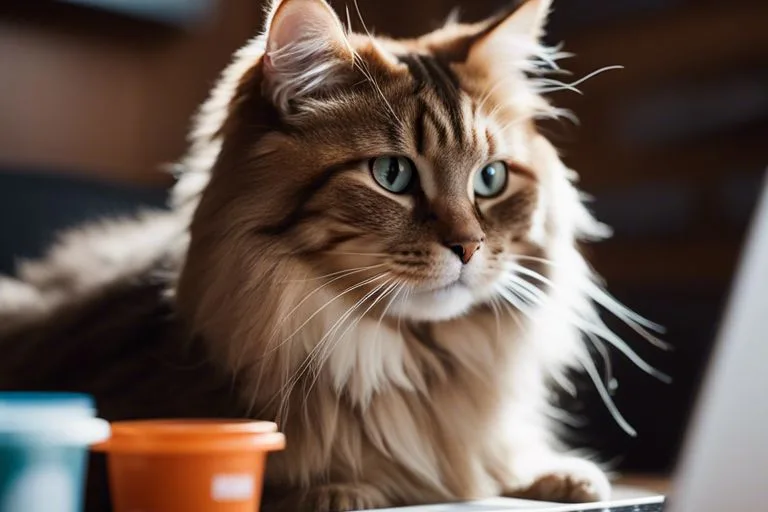If your beloved Siberian cat is constantly sneezing from its nose, you may be wondering what could be causing this concerning behavior. There are a few important factors to consider when your feline friend is experiencing persistent sneezing fits. It’s crucial to understand the potential dangers associated with this symptom, as well as the positive steps you can take to help your cat find relief. Let’s dive deeper into the reasons behind your Siberian cat’s constant sneezing and explore the best course of action to ensure their health and well-being.
Key Takeaways:
- Allergies: Siberian cats can develop allergies just like humans, and common allergens like pollen, dust, or mold could be causing your cat’s constant sneezing.
- Infections: Respiratory infections, such as the feline herpesvirus or feline calicivirus, can also cause frequent sneezing in Siberian cats and should be addressed by a veterinarian.
- Nasal Polyps or Foreign Objects: Polyps or foreign objects in your cat’s nasal passage could be the cause of their constant sneezing and should be examined by a professional.
- Dental Issues: Dental problems, such as tooth root abscesses, in Siberian cats can sometimes manifest as nasal discharge and sneezing, so it’s important to have their teeth checked regularly.
- Environmental Factors: Changes in your home environment, such as new furniture, cleaning products, or air fresheners, could be triggering your cat’s sneezing and should be taken into consideration.
Common Causes of Sneezing in Siberian Cats
Assuming that your Siberian cat is constantly sneezing from its nose, there could be several reasons behind this behavior. It’s important to understand the common causes of sneezing in Siberian cats so that you can address the issue effectively and ensure your feline companion’s well-being.
Allergies and Environmental Irritants
If your Siberian cat is constantly sneezing, it could be due to allergies or environmental irritants. Just like humans, cats can also be allergic to various substances such as pollen, dust, mold, or certain types of food. These allergens can trigger an immune response in your cat, leading to sneezing, nasal discharge, and itchy eyes. Additionally, exposure to cigarette smoke, strong perfumes, or cleaning products can also irritate your cat’s nasal passages, causing them to sneeze.
Infections and Respiratory Diseases
Another common cause of constant sneezing in Siberian cats is infections and respiratory diseases. Your cat may have contracted a viral or bacterial infection, such as feline herpesvirus or feline calicivirus, which can cause sneezing, nasal discharge, and other respiratory symptoms. In some cases, your cat may also develop more serious respiratory conditions such as feline asthma or pneumonia, leading to persistent sneezing and difficulty breathing. It’s important to have your cat examined by a veterinarian if you suspect that they may have an infection or respiratory disease.
Diagnostic Approaches
The first step in addressing your Siberian cat’s constant sneezing is to determine the underlying cause. The Cat Sneezing: Causes and When it’s a Concern resource can help you gain a better understanding of potential reasons for your cat’s symptoms. However, it’s important to consult with a veterinarian to accurately diagnose the issue.
When to Visit the Vet
If your Siberian cat is experiencing persistent and frequent sneezing episodes, or if you notice any other concerning symptoms such as nasal discharge, lethargy, decreased appetite, or difficulty breathing, it’s crucial to schedule a vet visit as soon as possible. These could be signs of a more serious underlying condition that requires medical attention. Ignoring these symptoms could lead to further complications and discomfort for your pet.
Typical Diagnostic Tests for Sneezing Cats
During your vet visit, the veterinarian may perform a thorough physical examination of your Siberian cat, focusing on the nasal passages and respiratory system. Additional diagnostic tests, such as blood work, urinalysis, X-rays, or even nasal swabs, may be recommended to identify any potential infections, allergies, or other underlying health issues contributing to your cat’s sneezing. These tests are essential for accurately diagnosing the root cause of your cat’s symptoms and determining the most effective treatment plan.
Treatment Options for Sneezing Cats
Despite your best efforts, your Siberian cat may still be experiencing persistent sneezing. In such cases, it’s important to seek proper treatment to address the underlying issues. Here are some treatment options to consider for your sneezing cat.
Home Care and Remedies
If your Siberian cat is constantly sneezing, there are some home care and remedies you can try to alleviate their symptoms. Keep your cat’s environment clean and free of dust and other potential irritants. You can also use a humidifier to help with any respiratory issues. Additionally, consider using a saline nasal spray to help clear out your cat’s nasal passages. If your cat is experiencing other symptoms such as nasal discharge or sneezing blood, it’s essential to seek immediate veterinary attention. Find out more about what to do if your cat is sneezing blood here.
Professional Medical Treatments
If your cat’s sneezing is persistent and accompanied by other concerning symptoms, it’s crucial to seek professional medical treatments from a veterinarian. They can perform a thorough examination to determine the root cause of the sneezing and recommend appropriate treatments. This may include prescribed medications, such as antibiotics for bacterial infections or antihistamines for allergies. In some cases, further diagnostic tests or procedures may be necessary to identify and address any underlying health issues. Seek professional medical help if you notice any alarming symptoms such as persistent nosebleeds or difficulty breathing.
Prevention and Long-Term Care
For long-term care and prevention of sneezing in your Siberian cat, there are a few key steps you can take to ensure your feline friend remains healthy and happy. It’s essential to take proactive measures to minimize potential allergens in your home and boost your cat’s immune system to prevent constant sneezing.
Managing Allergens in Your Home
If your Siberian cat is constantly sneezing, it may be triggered by allergens present in your home. To minimize these allergens, consider investing in a good air purifier and regularly vacuuming and dusting your home. Additionally, wash your cat’s bedding and toys regularly to keep them free of allergens. Reducing allergens in your home is crucial to preventing ongoing sneezing in your Siberian cat.
Boosting Your Cat’s Immune System
Another important aspect of preventing constant sneezing in your Siberian cat is to boost its immune system. Make sure your cat is getting a well-balanced and nutritious diet to keep its immune system strong. Additionally, consider providing immune-boosting supplements specifically designed for cats. By strengthening your cat’s immune system, you can help prevent frequent sneezing and ensure its overall health and well-being.
Why Is Your Siberian Cat Constantly Sneezing From Its Nose?
Ultimately, if your Siberian cat is constantly sneezing from its nose, it could be due to a variety of reasons. It is important to consider potential allergies, respiratory infections, or foreign objects in your cat’s nasal passages. It is crucial to take your cat to the vet for a thorough examination to determine the underlying cause of the sneezing and to receive appropriate treatment. Additionally, keeping your cat’s environment clean and free of potential irritants can help alleviate their symptoms. It is important to monitor your cat’s behavior and seek professional veterinary advice for the best course of action.
FAQ
Q: Why is my Siberian cat constantly sneezing from its nose?
A: There are several potential reasons for constant sneezing in a Siberian cat. Some common causes include allergies, respiratory infections, foreign objects lodged in the nasal passages, or dental issues. It is important to have your cat evaluated by a veterinarian to determine the underlying cause and provide appropriate treatment.
Q: What are some signs that my Siberian cat is experiencing more than just a typical sneeze?
A: If your Siberian cat is exhibiting more than just occasional sneezing, such as persistent or violent sneezing, nasal discharge, lethargy, loss of appetite, or breathing difficulties, these may be signs of a more serious issue and should prompt a visit to the vet. It’s important not to ignore these symptoms, as they could indicate an underlying health problem that requires prompt attention.
Q: How can I help alleviate my Siberian cat’s sneezing symptoms at home?
A: While it’s important to seek veterinary advice for persistent sneezing in your Siberian cat, you can help alleviate some symptoms at home. Ensure your cat’s living environment is clean and free from potential allergens, such as dust and cigarette smoke. Keep their bedding and litter box clean, and consider using an air purifier. Additionally, you can use a gentle saline solution to clean their nasal passages, but always consult with a veterinarian before trying any home remedies.



